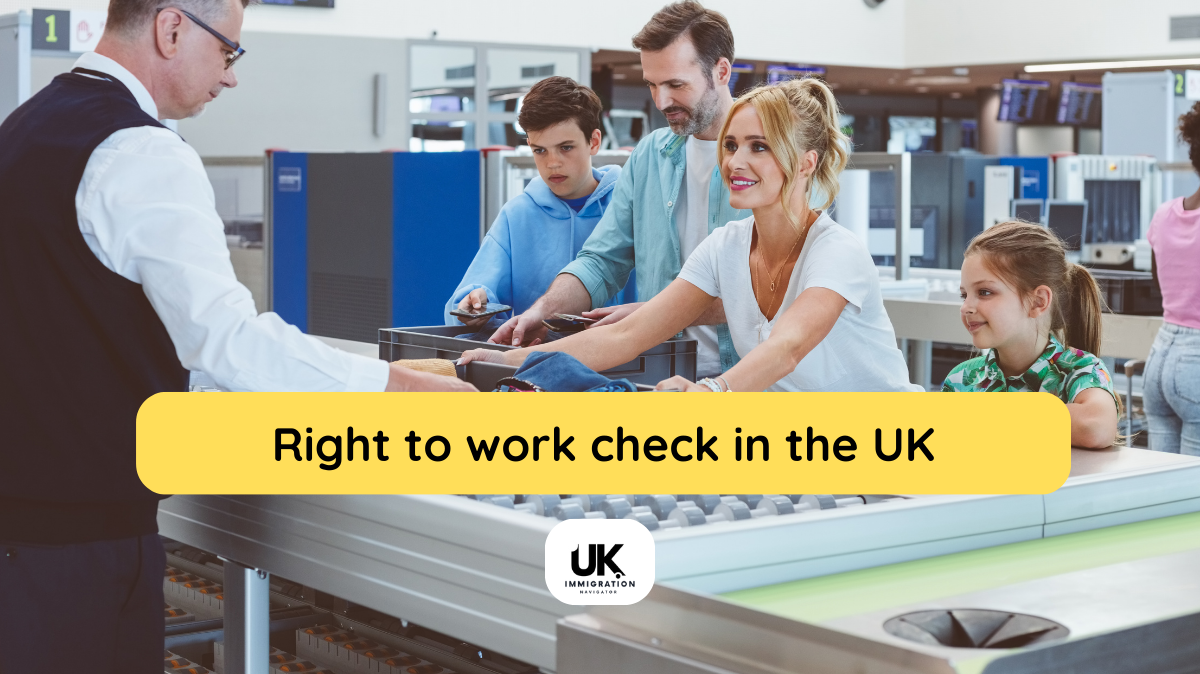Welcome to UK Immigration Navigator! In this article, we will cover everything you need to know about conducting a Right to Work check in the UK. Whether you’re an employer, HR professional, or employee, we’ll explain the legal requirements, step-by-step processes, and common pitfalls to avoid. Let’s get started!
What is a Right to work check in the UK?
A right to work (RTW) check is a legal requirement for UK employers to verify that all employees or contractors have valid permission to work in the UK. Introduced to prevent illegal working, these checks apply to every worker, regardless of nationality, including British citizens.
Table of Contents
Key Goals of RTW Checks:
- Ensure compliance with UK immigration laws.
- Avoid penalties for hiring unauthorized workers.
- Protect employees from exploitation.
Why Are Right to Work Checks Important?
Failing to conduct proper checks can result in:
- Civil Penalties: Up to £45,000 per illegal worker for employers.
- Criminal Charges: For knowingly employing unauthorized workers (unlimited fines or prison sentences).
- Reputational Damage: Loss of business trust and potential revocation of sponsor licenses.
In 2023 alone, UK employers faced over £14 million in fines for non-compliance.
Who Needs a Right to Work Check?
| Employee Type | Check Required? | Frequency |
|---|---|---|
| Permanent employees | Yes | Before employment starts |
| Temporary/contract workers | Yes | Before each contract renewal |
| Remote workers (UK-based) | Yes | Same as in-office staff |
| Students on Tier 4 visas | Yes | Check visa expiry dates |
Note: Checks are mandatory even for British citizens, though simplified.
How to Conduct a Right to Work Check in 2025
Follow these three steps to stay compliant:
Step 1: Obtain Original Documents
Employees must provide original, unexpired documents from either:
List A (Permanent Right to Work):
- UK/Irish passport or passport card.
- Birth/adoption certificate + official letter (e.g., NI number).
List B (Temporary Right to Work):
- Biometric Residence Permit (BRP).
- Visa vignette (e.g., Skilled Worker Visa).
- Share code + date of birth (for digital checks).
See the full list of acceptable documents.
Step 2: Verify Authenticity
- Physical Documents: Check photos, dates, and security features (e.g., holograms on BRPs).
- Digital Checks: Use the Home Office online service with the employee’s share code.
Tip: Retain copies of all documents for 2 years after employment ends.
Step 3: Conduct Follow-Up Checks
For List B holders (e.g., visa expiring in 2026), schedule follow-ups before their permission expires.
Digital Right to Work Checks (2024 Updates)
Since October 2022, employers can use certified Identity Service Providers (IDSPs) to verify British/Irish citizens remotely via:
- Biometric passport scans.
- Facial recognition technology.
Approved IDSPs: Include Post Office EasyID and TrustID.
Acceptable Documents at a Glance
| Document Type | Examples | Check Type |
|---|---|---|
| List A | UK passport, birth certificate + NI letter | Permanent |
| List B (Group 1) | BRP, Frontier Worker Permit | Temporary (with expiry) |
| List B (Group 2) | Asylum seeker permit, visa applications | Conditional |
Common Mistakes to Avoid
- Assuming All Citizens Have Automatic Rights
Example: British citizens must still provide a passport or birth certificate. - Missing Follow-Up Checks
Risk: Fines if a visa expires mid-employment. - Using Expired Documents
Example: A BRP valid until 2025 can’t be used in 2026. - Ignoring Digital Options
Tip: Digital checks save time for remote hires.
Penalties for Non-Compliance
| Violation | Civil Penalty | Criminal Charge |
|---|---|---|
| First offense (per worker) | Up to £20,000 | N/A |
| Repeat offense (per worker) | Up to £45,000 | Unlimited fines/jail time |
| Knowingly hiring illegally | N/A | Up to 5 years in prison |
Source: Home Office Guidance
Frequently Asked Questions (FAQ)
Q1: Can I accept a photocopy of a passport?
No. Only original documents or certified digital copies (via IDSPs) are valid.
Q2: How often should I conduct follow-up checks?
For temporary workers (List B), check again 28 days before their visa expires.
Q3: Do interns or volunteers need a right to work check?
Yes, if they’re paid or have a contractual obligation.
Q4: What if an employee’s right to work expires?
Terminate employment immediately or risk fines.
Q5: Are EU citizens exempt after Brexit?
No. EU nationals arriving after 2020 must provide a visa or EU Settlement Scheme status.
Key Takeaways for Employers in 2025
- Consistency is Key: Check every employee, every time.
- Leverage Technology: Use digital checks for efficiency.
- Stay Organized: Keep records for at least two years post-employment.
- Train Your Team: Ensure HR staff understand evolving rules.
Need help? Use the Home Office Employer Checking Service for complex cases. For more guides, explore our articles on Skilled Worker Visas or Sponsorship Licences.
